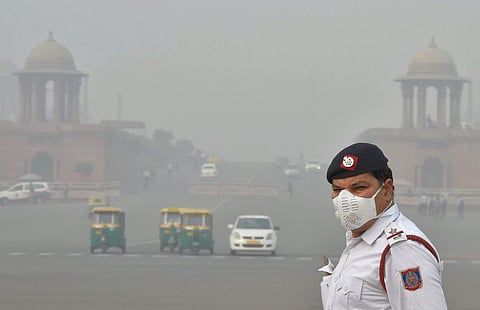UK research finds excess deaths in key Indian cities linked to air pollution
LONDON: The increase in the number of people dying prematurely from the exposure to air pollution is extremely high in major Indian cities, totalling around 1,00,000 over the years, new research in the UK has found.
The study, led by researchers at the University of Birmingham and University College London (UCL) and published in 'Science Advances' last week, found that around 180,000 avoidable deaths over 14 years in fast-growing tropical cities were caused by a rapid rise in emerging air pollution.
The increase in the number of people dying prematurely from exposure to air pollution was found to be highest in cities in South Asia in particular Dhaka in Bangladesh (totalling 24,000 people) and the Indian cities of Mumbai, Bangalore, Kolkata, Hyderabad, Chennai, Surat, Pune and Ahmedabad (totalling 100,000 people).
"Open burning of biomass for land clearance and agricultural waste disposal has in the past overwhelmingly dominated air pollution in the tropics," said Dr Karn Vohra, lead author of the research from UCL Geography, who completed the study as a PhD student at the University of Birmingham.
"Our analysis suggests we're entering a new era of air pollution in these cities, with some experiencing rates of degradation in a year that other cities experience in a decade," he said.
The international team of scientists aimed to address data gaps in air quality for 46 future megacities in Africa, Asia and the Middle East, using space-based observations from instruments onboard NASA and European Space Agency (ESA) satellites for 2005 to 2018.
Across all the cities, the authors found significant annual increases in pollutants directly hazardous to health of up to 14 per cent for nitrogen dioxide (NO2) and up to 8 per cent for fine particles (PM2.5), as well as increases in precursors of PM2.5 of up to 12 per cent for ammonia and up to 11 per cent for reactive volatile organic compounds.
The researchers attributed this rapid degradation in air quality to emerging industries and residential sources like road traffic, waste burning, and widespread use of charcoal and fuelwood.
The scientists also found 1.5 to four-fold increases in urban population exposure to air pollution over the study period in 40 of the 46 cities for NO2 and 33 of the 46 cities for PM2.5, caused by a combination of population growth and rapid deterioration in air quality.
Study co-author Dr Eloise Marais, of UCL Geography, said: "We continue to shift air pollution from one region to the next, rather than learning from errors of the past and ensuring rapid industrialisation and economic development don't harm public health. We hope our results will incentivise preventative action in the tropics.
Besides South Asian cities, the African cities studied included Abidjan, Abuja, Addis Ababa, Antananarivo, Bamako, Blantyre, Conakry, Dakar, Dar es Salaam, Ibadan, Kaduna, Kampala, Kano, Khartoum, Kigali, Kinshasa, Lagos, Lilongwe, Luanda, Lubumbashi, Lusaka, Mombasa, N'Djamena, Nairobi, Niamey, Ouagadougou.
The researchers say that while the number of deaths in tropical cities in Africa is currently lower due to recent improvements in healthcare across the continent resulting in a decline in overall premature mortality, the worst effects of air pollution on health will likely occur in the coming decades.
In Southeast Asia, the research looked at Bangkok, Hanoi, Ho Chi Minh City, Jakarta, Manila, Phnom Penh, Yangon and in the Middle East Riyadh and Sana'a.
The study was funded by a University of Birmingham Global Challenges PhD Studentship awarded to Vohra and a NERC/EPSRC grant awarded to Marais.

